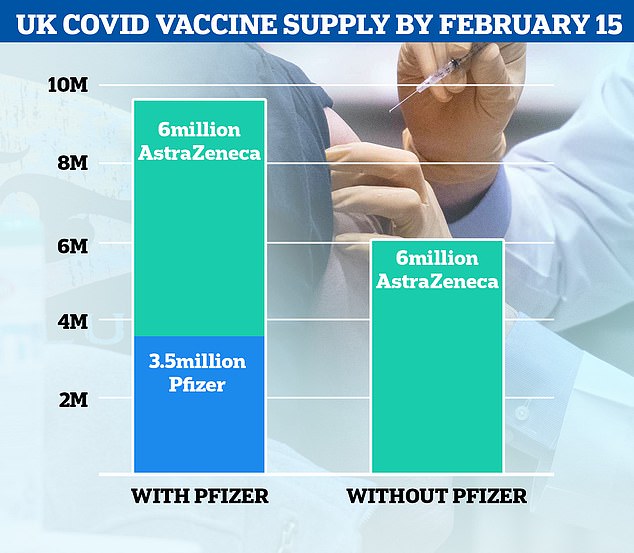The UK could miss out on millions of doses of the coronavirus vaccine if the European Union suspends deliveries to countries outside the bloc.
Britain is expecting to receive another 9million doses by mid-February from Oxford/AstraZeneca and Pfizer/BioNTech.
But if Eurocrats blockade jab exports across the channel, American drugs company Pfizer – which manufactures vaccines in Puurs, Belgium – will be unable to ship supplies.
As many as 3.5million doses of their jab are expected to arrive over the next three weeks, reports the Telegraph, a shipment that wouldn’t land on British soil if Brussels chose to redirect supplies.
The move would not, however, cut supplies of the AstraZeneca vaccine because the ‘vast, vast majority’ of their jabs are made in the UK.
There are fears that any cut in deliveries could leave the Government unable to meet its target of vaccinating 15million of the most vulnerable by mid-February.
But it is not clear how many doses are already sitting in warehouses in the UK, which ministers say they won’t reveal because of ‘security concerns’.
The vaccines minister Nadhim Zahawi said today he was confident the EU’s threat to block supplies of the Pfizer vaccine would not affect the UK’s stocks.
And the Health Secretary Matt Hancock warned at a conference last night that supply remained the ‘limiting factor’ in Britain’s Covid-19 vaccine rollout.
The UK has already vaccinated more than six million of the most vulnerable against the virus, as it steams towards its mid-February target.

Europe’s vaccine roll-out was already among the slowest in the world, but has been hit by further problems as France’s Pasteur Institute mothballed its jab on Monday and AstraZeneca cut supplies to the bloc by 60 per cent due to ‘supply issues’
Asked whether deliveries of the Pfizer jab could be delayed, Mr Zahawi said he was ‘confident’ they would be delivered on time.
‘Pfizer have made sure that they have always delivered for us, they will continue to do so,’ he told Sky News.
‘They have made a very important announcement on the equitable supply of the whole world, including the European Union, and I’m sure they will deliver for the European Union, the United Kingdom and for the rest of the world.
‘We have got 367million vaccines that we have ordered from seven different suppliers, so I’m confident we will meet our target and continue to vaccinate the whole of the adult population by the autumn.’
He also sought to dampen fears the UK would not meet its target if doses were held up at the border, saying the programme remained ‘on track’.
The minister later told the BBC that supplies were ‘tight’, and ‘lumpy and bumpy’, but stressed that deliveries would come through.
Conservative MPs have warned that any delay to Britain’s supplies from the EU could ‘poison relations for a generation’.
AstraZeneca is expected to start delivering 2million doses a week by the end of the third week in January, its president Tom Keith-Roach told Parliament’s Science and Technology committee on January 13.
If the target has been met, it means the UK will receive six million doses over the next three weeks from factories in Oxford and Wrexham.
It had already supplied 1.1million doses by January 1, and initially aimed to hit 2million by January 10.
Ministers have refused to reveal how many doses are already sitting in warehouses across the country ready to be sent out to the most vulnerable.
It comes amid a bitter feud between the European Union and AstraZeneca over vaccine deliveries, with the company saying it won’t be able to provide the quantities it promised in earlier orders on the original timescale.
In response, the trade bloc – which has not even approved their vaccine – has threatened to halt exports of Covid-19 shots, which could include millions of Pfizer doses bound for Britain.
EU health chiefs have ordered drug companies to tell them when they are exporting to countries outside the union – meaning American giant Pfizer will need to let Eurocrats know when it tries to send doses to the UK.
The jab has already been approved in the UK, as well as Argentina, Dominican Republic, El Salvador, Mexico and Morocco, while Canadian officials have asked for more data before approving the vaccine.
The Oxford jab is cheaper and easier to store than the rival Pfizer/BioNtech vaccine – which is also being used in Germany.
The Oxford vaccine can be stored, transported and handled at normal refrigerated conditions. This is unlike the Pfizer vaccine, which needs to be kept at minus 70C.
But the Oxford/AstraZeneca vaccine came under fire last year when initial tests showed the vaccine was 62 per cent effective when two full doses were given at least a month apart.
This was less than the Pfizer and Moderna vaccines, which were both shown to be 95 per cent effective.
